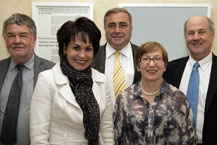Latest News Archive
Please select Category, Year, and then Month to display items
12 October 2020
|
Story Dr Cindé Greyling
|
Photo Supplied
 Exercise and nutrition can work wonders for your mental health – you don’t even have to ‘feel like’ or ‘enjoy’ moving around and eating well for it to work – it does its thing anyway.
Exercise and nutrition can work wonders for your mental health – you don’t even have to ‘feel like’ or ‘enjoy’ moving around and eating well for it to work – it does its thing anyway.
Nowadays, people talk about mental health like it is the common cold – which is good! But do you know what it really means? Being mentally healthy does not only refer to the absence of a mental illness but includes your emotional and social well-being. One would almost want to add physical well-being too, since a healthy body does indeed support a healthy mind. However, since so many people consider themselves ‘mental health experts’, some myths have been sold as truths.
Myth #1 – You are doomed.
Nope. Never. You are never doomed. There is always help. Mental-health therapies range from self-help, talk therapy, medication, to hospitalisation in some cases. Somewhere on this spectrum of treatments, there will be something that works for you. But you must be willing to get the help and do the work. For starters, exercise and nutrition can work wonders – you do not even have to ‘feel like’ or ‘enjoy’ moving around and eating well for it to work – it does its thing anyway.
Myth #2 – It won’t affect you.
It may. Research suggests that one in five people may suffer from a mental illness at some point in their lives. Being well now does not mean that it will stay that way. Biological and environmental factors both impact your mental health. Hopefully not, but at some point, you may experience an event that affects your mental health.
To remain integrated in a community is always beneficial
for anyone suffering from a mental or physical condition.
Myth #3 – Someone struggling with mental health must be left alone.
Hardly! To remain integrated in a community is always beneficial for anyone suffering from a mental or physical condition. You do not need to fix them, but to remain a friend. Continue to invite them, even if they decline. Do not judge, and do not try to understand. Just stay around.
Go and be kind to yourself, and to those around you.
Good practice discussed during workshop of the ACU Benchmarking Programme
2012-09-10
 |
|
From the left are: Prof. John Brennan, assessor from the Open University in the UK; Prof. Driekie Hay, Vice-Rector: Academic, UFS; Mr Cliff Wragg, ACU Benchmarking Programme Manager; Prof. Ellen Hazelkorn, assessor from Dublin Institute of Technology in Ireland; and Mr Mike Gallagher, Executive Director of Go8 in Australia.
Photo: Johan Roux
10 September 2012
|
The ACU University Management Benchmarking Programme presented a workshop on the Bloemfontein Campus of the University of the Free State (UFS) from 27 to 29 August 2012.
The programme offers a unique and cost-effective opportunity for participating universities to compare their key management processes with those in a range of other universities. This helps to identify areas for change and assists in setting targets for improvement and identifying techniques for managing change. The outcomes of the programme provide models of good practice. It creates the opportunity for networking and a workshop, guided by internationally acknowledged subject experts. This year representatives from universities in among others Australia, the South Pacific, Canada, the United Kingdom (UK) and South Africa attended the workshop. The topics discussed were financial management, managing league tables and ranking and managing graduate outcomes.